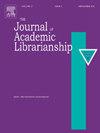Estimating the quality of academic books from their descriptions with ChatGPT
IF 2.3
3区 管理学
Q2 INFORMATION SCIENCE & LIBRARY SCIENCE
引用次数: 0
Abstract
Although indicators based on scholarly citations are widely used to support the evaluation of academic journals, alternatives are needed for scholarly book acquisitions. This article assesses the value of research quality scores from ChatGPT 4o-mini for 9830 social sciences, arts, and humanities books from 2019 indexed in Scopus, based on their titles and descriptions but not their full texts. Although most books scored the same (3* on a 1* to 4* scale), the citation rates correlate positively but weakly with ChatGPT 4o-mini research quality scores in both the social sciences and the arts and humanities. Part of the reason for the differences was the inclusion of textbooks, short books, and edited collections, all of which tended to be less cited and lower scoring. Some topics also tend to attract many/few citations and/or high/low ChatGPT scores. Descriptions explicitly mentioning theory and/or some methods also associated with higher scores and more citations. Overall, the results provide some evidence that both ChatGPT scores and citation counts are weak indicators of the research quality of books. Whilst not strong enough to support individual book quality judgements, they may help academic librarians seeking to evaluate new book collections, series, or publishers for potential acquisition.
用ChatGPT从学术书籍的描述中估计其质量
虽然基于学术引文的指标被广泛用于支持学术期刊的评估,但学术书籍的收购需要替代指标。本文评估了ChatGPT 40 -mini对2019年在Scopus中检索的9830本社会科学、艺术和人文学科书籍的研究质量得分的价值,基于它们的标题和描述,而不是全文。虽然大多数书的得分都是一样的(在1*到4*的尺度上是3*),但引用率与社会科学、艺术和人文学科的ChatGPT 40 -mini研究质量得分呈正相关,但相关性很弱。造成这种差异的部分原因是包括教科书、小书和编辑集,所有这些都倾向于被引用较少,得分较低。一些主题也倾向于吸引多/少的引用和/或高/低的ChatGPT分数。明确提到理论和/或某些方法的描述也与更高的分数和更多的引用相关。总体而言,研究结果提供了一些证据,表明ChatGPT分数和被引次数都是书籍研究质量的弱指标。虽然不足以支持个人图书质量判断,但它们可以帮助学术图书管理员评估新藏书、系列或潜在收购的出版商。
本文章由计算机程序翻译,如有差异,请以英文原文为准。
求助全文
约1分钟内获得全文
求助全文
来源期刊

Journal of Academic Librarianship
INFORMATION SCIENCE & LIBRARY SCIENCE-
CiteScore
5.30
自引率
15.40%
发文量
120
审稿时长
29 days
期刊介绍:
The Journal of Academic Librarianship, an international and refereed journal, publishes articles that focus on problems and issues germane to college and university libraries. JAL provides a forum for authors to present research findings and, where applicable, their practical applications and significance; analyze policies, practices, issues, and trends; speculate about the future of academic librarianship; present analytical bibliographic essays and philosophical treatises. JAL also brings to the attention of its readers information about hundreds of new and recently published books in library and information science, management, scholarly communication, and higher education. JAL, in addition, covers management and discipline-based software and information policy developments.
 求助内容:
求助内容: 应助结果提醒方式:
应助结果提醒方式:


